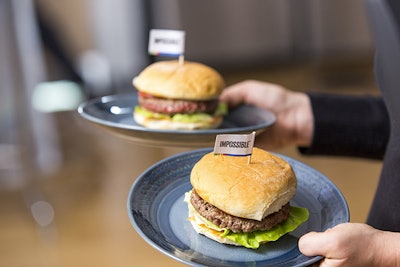
Impossible Foods has cut the amount of saturated fat and increased protein in its plant-based beef, which places its nutritional value more in line with animal-derived protein products, the company announced.
The move comes amid weakening sales in the meat alternative category and growing concerns about the product’s nutritional claims.
Peter McGuinness, the CEO of Impossible Foods, called the situation “frustrating” to Food Navigator, adding that “we’re going to continue to improve so that the nutritional picture – which is already strong – becomes undebatable, because there’s still confusion around, Hey, is it really better for me?”
Other changes to the product, which has been renamed to Impossible Beef, include less coconut oil, the removal of potato protein and the addition of amino acid and increased soy protein content.
The new recipe means that Impossible Beef contains 38% of the recommended daily value of protein, the same as 80/20 ground beef.
The health halo surrounding plant-based meat
Consumers who buy plant-based proteins typically cite health and nutrition as one of the top considerations for consumption, however recent research has debunked many of the segment’s nutrition claims.
Fewer nutrients found in the plant proteins used to create meat alternatives, such as soybeans, are accessible by human cells compared to traditional animal proteins like chicken, revealed a July 2022 study published in the Journal of Agricultura and Food Chemistry.
The alternative protein sector hasn’t been transparent enough about the ingredients or the processes involved in creating plant-based meat, Maeve Webster, CEO of Menu Matters, said during the 2022 Animal Agriculture Alliance Stakeholders Summit on May 11 in Kansas City, Missouri.
“This issue of transparency around what these products is probably the biggest Achilles heel that this entire category has. There’s a lot of talk around what these products can do for you with regard to health, in particular around sustainability, but (consumers are asking) is this all true, and what exactly am I eating,” she said.
















